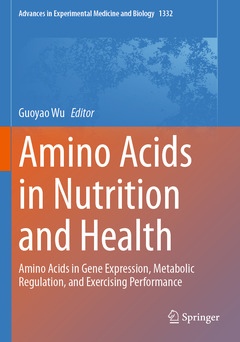Amino Acids in Nutrition and Health, 1st ed. 2021 Amino Acids in Gene Expression, Metabolic Regulation, and Exercising Performance Advances in Experimental Medicine and Biology Series, Vol. 1332
Coordonnateur : Wu Guoyao

This book explains about amino acids (AAs) which are not only building blocks of protein, but are also signaling molecules as well as regulators of gene expression and the protein phosphorylation cascade. Additionally, AAs are key precursors for syntheses of hormones and low-molecular-weight nitrogenous substances with each having enormous biological importance. For example, physiological concentrations of AA metabolites (e.g., nitric oxide, polyamines, glutathione, taurine, thyroid hormones, and serotonin) are required for cell functions. Growing evidence shows that humans and animals have dietary requirements for all proteinogenic AAs. Mammals, birds, and fish also have species- and age-dependent needs for some AA-related substances. However, elevated levels of other products (e.g., ammonia, homocysteine, H2S, and asymmetric dimethylarginine) are pathogenic factors for neurological disorders, oxidative stress, and cardiovascular disease. Thus, optimal amounts of AAs and their ratios in diets and circulation are crucial for whole-body homeostasis and health. Adequate provision of one or a mixture of functional AAs or metabolites may be beneficial for ameliorating health problems at various stages of the life cycle (e.g., fetal growth restriction, neonatal morbidity and mortality, weaning-associated intestinal dysfunction and wasting syndrome, obesity, diabetes, cardiovascular disease, the metabolic syndrome, and infertility). Dietary supplementation of these nutrients can also optimize the efficiency of metabolic transformations to enhance muscle growth, milk production, and athletic performance, while preventing excess fat deposition and reducing adiposity. Therefore, functional AAs hold great promise in improving the growth, health, and well-being of individuals.
Chapter 1: Regulation of Gene Expression by Amino Acids in Animal Cells.- Chapter 2: Amino acids in cell signaling: regulation and function.- Chapter 3: Amino Acids in Endoplasmic Reticulum Stress and Redox Signaling.- Chapter 4: Amino Acids in Autophagy: Regulation and Function.- Chapter 5: Oxidation of Energy Substrates in Tissues of Fish: Metabolic Significance and Implications for Gene Expression and Carcinogenesis.- Chapter 6: Arginine, Agmatine and Polyamines: Key Regulators of Conceptus Development in Mammals.- Chapter 7: Interorgan Metabolism of Glutamate and Glutamine in Poultry.- Chapter 8: Interorgan Metabolism of Amino Acids in Health and Disease.- Chapter 9: Amino Acids and Their Metabolites for Improving Human Exercising Performance.- Chapter 10: Role of L-Arginine in Nitric Oxide Synthesis and Health in Humans.- Chapter 11: Composition of Amino Acids in Foodstuffs for Humans and Animals.- Chapter 12: Dietary Intakes of Amino Acids and Other Nutrients by Adult Humans.
Guoyao Wu is Distinguished Professor, University Faculty Fellow, and AgriLife Research Senior Faculty Fellow in the Department of Animal Science. He also holds appointments with the Graduate Faculty of Nutrition, the Departments of Systems Biology and Translational Medicine and Veterinary Integrative Biosciences.
He earned his bachelor’s degree in animal science from South China Agricultural University in Guangzhou, a master’s degree in animal nutrition from Beijing Agricultural University, and a master’s degree and doctorate in animal biochemistry from the University of Alberta in Canada. He received postdoctoral training in biochemistry and nutrition at McGill University Medical School in Montreal, Canada, and at the Memorial University of Newfoundland Medical School in St. John’s, Canada.
Dr. Wu teaches graduate courses in protein metabolism and nutritional biochemistry. He conducts research in protein and amino acid metabolism at molecular, cellular, and whole-body levels. The animal models used in his research include cattle, chicks, pigs, rats, and sheep.
Date de parution : 07-2022
Ouvrage de 227 p.
17.8x25.4 cm
Date de parution : 07-2021
Ouvrage de 227 p.
17.8x25.4 cm
Thèmes d’Amino Acids in Nutrition and Health :
Mots-clés :
aminoacids; cell signaling; health; metabolism; nutrition; cancer



